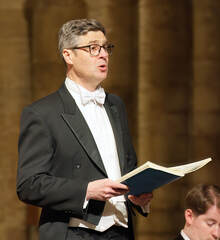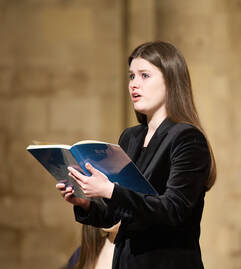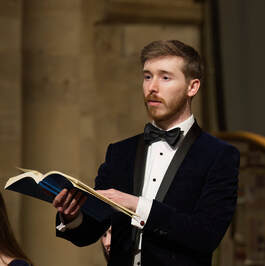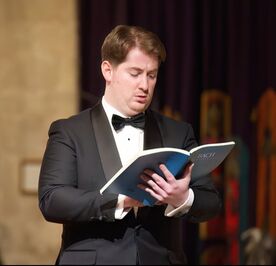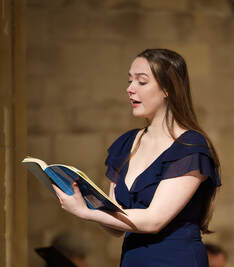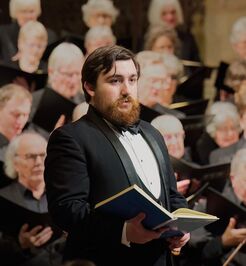J.S. Bach St John Passion - March 2024 in Romsey Abbey
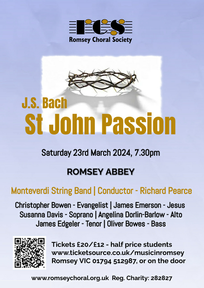
Review: JS Bach’s St John Passion, Romsey Abbey, 23rd March 2024
Romsey Choral Society’s Lenten concert, which took place in the majestic surroundings of Romsey Abbey on the eve of Palm Sunday, was a triumph on every level. Sung in German, this performance of JS Bach’s St John Passion – the Easter story according to the Gospel of John – took place almost 300 years to the day after its premiere in St Nicholas’ Church, Leipzig. Under the expert guidance of Musical Director Richard Pearce, soloists, choir and orchestra collaborated to bring to life a glorious rendition of this giant amongst choral works, to the evident delight of a large and appreciative audience.
Romsey Choral Society’s Lenten concert, which took place in the majestic surroundings of Romsey Abbey on the eve of Palm Sunday, was a triumph on every level. Sung in German, this performance of JS Bach’s St John Passion – the Easter story according to the Gospel of John – took place almost 300 years to the day after its premiere in St Nicholas’ Church, Leipzig. Under the expert guidance of Musical Director Richard Pearce, soloists, choir and orchestra collaborated to bring to life a glorious rendition of this giant amongst choral works, to the evident delight of a large and appreciative audience.
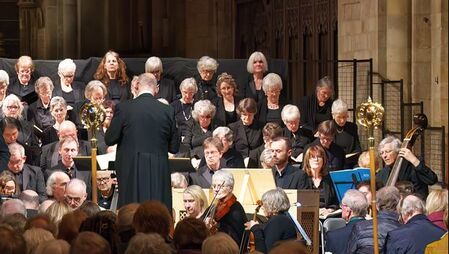
Accompanied by the outstanding Monteverdi String Band, a consort which specialises in the music of the 17th century and uses authentic period instruments, the 80-strong choir opened in assertive style with the declamatory “Herr, unser Herrscher” (“Lord our ruler”), navigating the complex counterpoint and relentless semiquaver passages with metronomic accuracy, whilst asserting with great conviction that Jesus was indeed the Son of God. The choir, which alternated between representing a jeering crowd of non-believers and Christ’s followers, succeeded in characterising both groups convincingly. At one moment, mocking interjections – signalled by furious and tortuous vocal lines – would be delivered with immaculate timing and alarming fervour; the next, the mood would change completely, as a gentle and melodic chorale reminded us of the significance of the crucifixion to Christian faith. The musical and interpretative skills of the choir were excellent throughout, as was their mastery of some challenging German text. Worthy of particular mention were the frenzied, vitriolic pleas to crucify Jesus (“Kreuzige, kreuzige“ and “Weg, weg mit dem”) and, in complete contrast, the hauntingly beautiful final chorus “Ruht wohl”, in which the choir prayed with heart-wrenching intensity for Jesus’ soul and the salvation of all humanity.
Sharing the stage was a team of six professional soloists, led by Baroque oratorio expert Christopher Bowen, who, as the Evangelist, narrated the story of Jesus’ betrayal, arrest, crucifixion and death. With the timbre of his lyrical tenor voice commanding instant attention, he gauged carefully his pace of delivery to bring constant colour and drama to the text.
Bass James Emerson, as Jesus, showed great maturity in the role and navigated effortlessly intricate dialogues with the Evangelist and Pontius Pilate (bass Oliver Bowes). Completing the soloist team were soprano Susanna Davis, alto Angelina Dorlin-Barlow and tenor James Edgeler, who, along with James and Oliver, are postgraduate choral scholars at the Royal College of Music and the Royal Academy of Music and are at the outset of their professional careers. Notable highlights of their contributions included Susanna’s delightfully uplifting and inspiring aria “Ich folge dir” (“I follow you”) as Jesus is arrested and interrogated, accompanied by his disciple Peter; James’ soul-searching “Ach mein Sinn” (“Oh my soul”) in which he agonises over how his sins will be forgiven, now that Jesus has been denied three times by Peter; Angelina’s powerful acclamation “Es ist vollbracht” (“It is accomplished”), where despair at Jesus’ death gives way to joy that ‘‘the hero battles on with might’’ and Oliver’s euphoric response “Mein teurer Heiland” (“My beloved Saviour”) in which he affirms allegiance to the crucified Christ, now that he has received redemption.
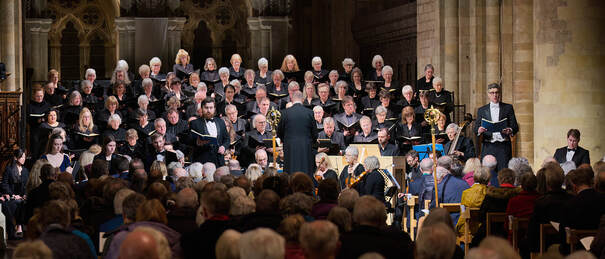
For almost two hours, the soloists, choir and orchestra interplayed seamlessly, transporting the enthralled audience along a roller-coaster of emotions as the theatre unfolded. A remarkable occasion, it served as a fitting memorial to David St John, a greatly missed former member of Romsey Choral Society, whose generous bequest to the choir, together with financial support from the Josephine Baker Trust, had assisted with the funding of the concert.
Kath Tilling
25.03.2024
Kath Tilling
25.03.2024
The Choir |
Concerts |
|

